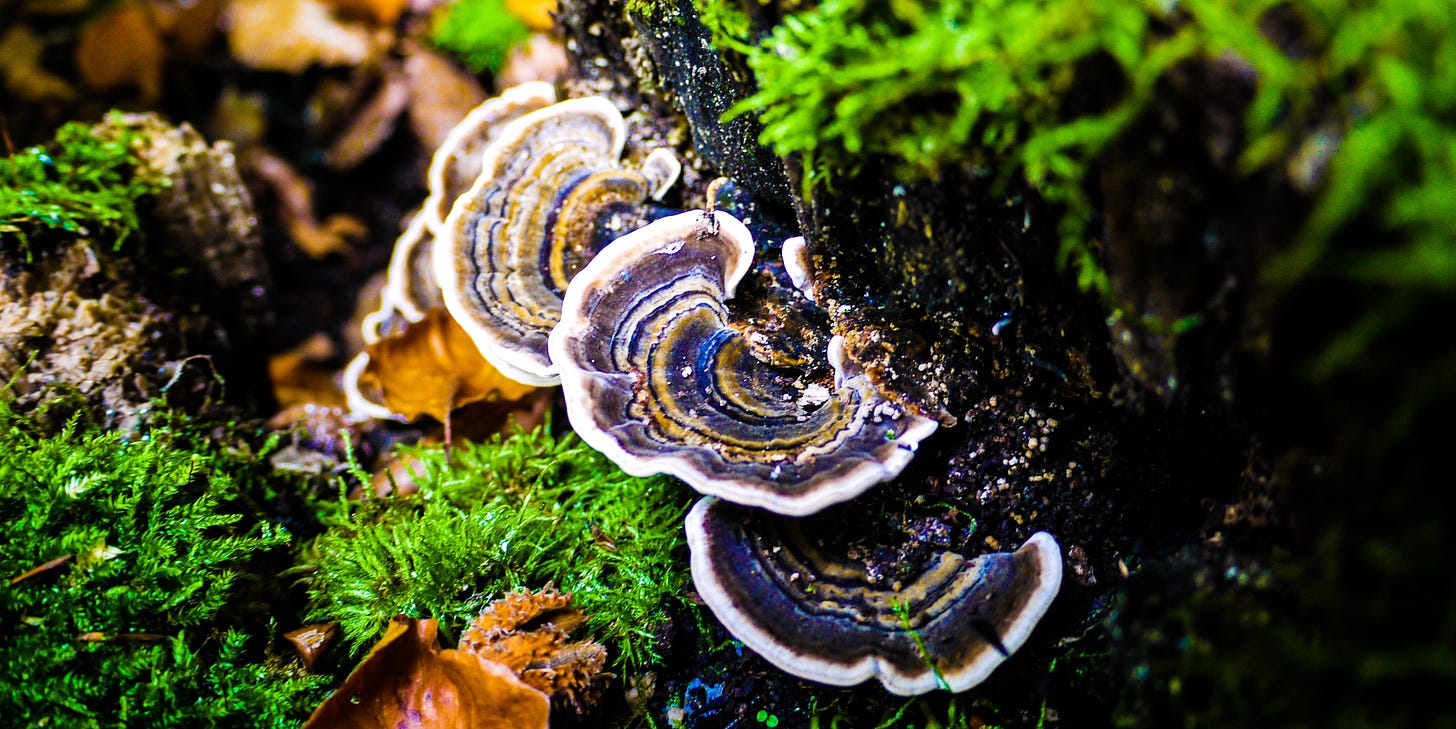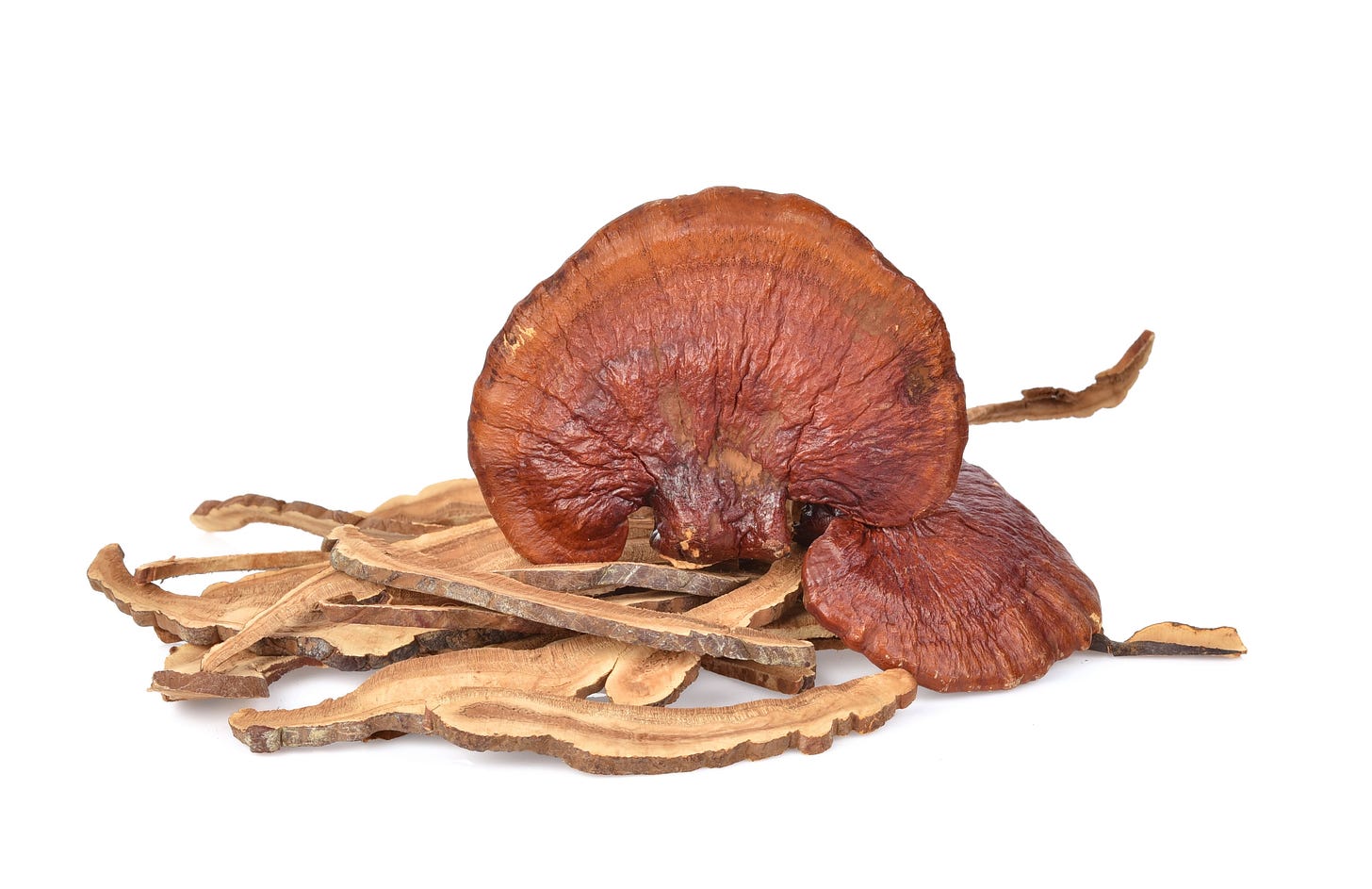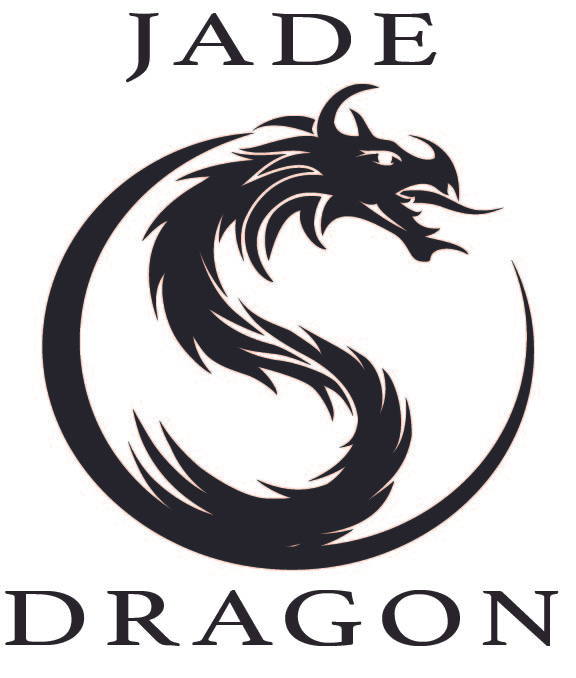The Healing Powers of Chaga, Shiitake, Maitake, Turkey Tail, and Reishi
Integrating Ancient Traditions with Scientific Discoveries
Introduction
The world of medicinal mushrooms is rich and diverse, with species like Chaga, Shiitake, Maitake, Turkey Tail, and Reishi standing out for their remarkable health benefits. These fungi have been used in traditional medicine systems for centuries and have gained significant attention in modern scientific research. This blog post delves into the historical and traditional uses of these mushrooms and integrates these perspectives with contemporary scientific findings, providing a comprehensive overview of their therapeutic potentials.
Historical and Traditional Uses
Chaga (Inonotus obliquus)
Chaga, a parasitic fungus that primarily grows on birch trees in cold climates, has a long history of use in traditional medicine, particularly in Russia and other Northern European countries. Historically, Chaga has been used to treat a variety of ailments, including gastrointestinal disorders, cardiovascular diseases, and cancer. The indigenous peoples of Siberia revered it as a potent adaptogen, helping the body resist stressors of all kinds.
Shiitake (Lentinula edodes)
Shiitake mushrooms have been cultivated for over a thousand years in East Asia. In Traditional Chinese Medicine (TCM), Shiitake is known as "Xiang Gu" (香菇), which translates to "fragrant mushroom." It has been used to boost immunity, improve circulation, and promote longevity. Japanese traditional medicine also utilized Shiitake for its ability to enhance vitality and treat respiratory diseases.
Maitake (Grifola frondosa)
Maitake, also known as "Hen of the Woods," has been a staple in traditional Japanese and Chinese medicine. Its name in Japanese, "Dancing Mushroom," reflects the joy experienced by those who found it, owing to its reputed health benefits. Maitake has traditionally been used to enhance the immune system, regulate blood sugar levels, and support overall wellness.
Turkey Tail (Trametes versicolor)
Turkey Tail is a common mushroom found worldwide, recognized by its colorful, fan-shaped fruiting bodies. In TCM, Turkey Tail is known as "Yun Zhi" (雲芝), and it has been used for centuries to enhance immune function, treat infections, and support liver health. Native American healers also utilized Turkey Tail for its immune-boosting properties.
Reishi (Ganoderma lucidum)
Reishi, known as "Ling Zhi" (靈芝) in Chinese, has a history spanning over 2,000 years. It is one of the oldest symbols of longevity and spiritual potency in East Asia. In TCM, Reishi is considered a superior herb, used to promote calmness, improve sleep, enhance vitality, and support heart health.
Modern Scientific Perspectives
Chaga: An Immunomodulator and Antioxidant Powerhouse
Modern research has validated many of the traditional uses of Chaga. Studies have shown that Chaga contains a variety of bioactive compounds, including polysaccharides, triterpenoids, and polyphenols, which exhibit significant immunomodulatory and antioxidant activities (Shashkina, Shashkin, & Sergeev, 2006). These compounds help in reducing oxidative stress, modulating the immune response, and potentially exhibiting anti-cancer properties (Park et al., 2005).
Shiitake: Immune Support and Anti-Cancer Properties
Shiitake mushrooms are rich in lentinan, a polysaccharide that has been extensively studied for its immune-boosting and anti-cancer properties. Clinical trials have demonstrated lentinan's ability to enhance the immune system, particularly by stimulating macrophages and T-lymphocytes (Chihara, 1992). Additionally, Shiitake mushrooms contain eritadenine, a compound known to lower cholesterol levels and improve cardiovascular health (Sugiyama et al., 1995).
Maitake: Balancing Blood Sugar and Boosting Immunity
Maitake mushrooms are noted for their high concentration of beta-glucans, complex sugars that can stimulate the immune system. Research indicates that these beta-glucans can enhance the activity of natural killer cells, which play a crucial role in the body's defense against tumors (Adachi et al., 1994). Furthermore, studies have shown that Maitake can help regulate blood sugar levels by improving insulin sensitivity (Kubo et al., 1994).
Turkey Tail: Cancer Adjunct Therapy and Immune Enhancement
Turkey Tail mushrooms contain polysaccharopeptides (PSP) and polysaccharide-K (PSK), both of which have been shown to have potent immune-enhancing effects. PSK, in particular, is approved as an adjunct treatment for cancer in Japan, where it is used alongside chemotherapy to improve survival rates and quality of life for patients (Fisher & Yang, 2002). PSP has also demonstrated anti-cancer activities, making Turkey Tail a valuable mushroom in oncology (Ooi & Liu, 2000).
Reishi: Adaptogen and Cardiovascular Protector
Reishi mushrooms are rich in triterpenoids, polysaccharides, and peptidoglycans, which contribute to their wide range of therapeutic effects. Modern research has highlighted Reishi's role as an adaptogen, helping the body adapt to stress and improve overall resilience (Paterson, 2006). Reishi has also been found to have cardiovascular benefits, including lowering blood pressure, reducing cholesterol levels, and preventing blood clots (Gao, Zhou, & Zhang, 2003).
Integrating Traditional and Modern Perspectives
Immune System Support
The immune-boosting properties of these mushrooms are among their most well-documented benefits. Traditional uses align closely with modern findings, particularly concerning their polysaccharide content. For instance, the beta-glucans in Maitake and the lentinan in Shiitake have been shown to enhance immune function through the activation of macrophages, dendritic cells, and natural killer cells (Chen & Seviour, 2007). These findings underscore the traditional use of these mushrooms in supporting the immune system and treating infections.
Anti-Cancer Properties
The anti-cancer properties of these mushrooms are well-supported by both traditional and modern medicine. Reishi's use as a longevity herb in TCM correlates with its modern application in cancer therapy due to its ability to induce apoptosis in cancer cells and inhibit tumor growth (Wang et al., 2012). Similarly, the use of Turkey Tail in traditional medicine for immune enhancement is validated by its current use in Japan as an adjunct to cancer treatment, highlighting the effectiveness of its polysaccharopeptides in improving patient outcomes (Fisher & Yang, 2002).
Cardiovascular Health
The cardiovascular benefits of these mushrooms also reflect a synthesis of traditional and contemporary knowledge. Traditional uses of Shiitake and Reishi for improving circulation and heart health are supported by modern studies showing their ability to lower cholesterol and blood pressure (Gao et al., 2003; Sugiyama et al., 1995). This integration illustrates how ancient wisdom can inform and align with modern health practices.
Adaptogenic and Anti-Stress Properties
The adaptogenic properties of Reishi and Chaga are another area where traditional use and modern research converge. Reishi's role in TCM as a herb for promoting calmness and resilience is mirrored by studies showing its ability to modulate the stress response and improve mental clarity (Paterson, 2006). Chaga's traditional use as an adaptogen is supported by its antioxidant properties, which help mitigate the effects of stress and inflammation in the body (Park et al., 2005).
Conclusion
The convergence of traditional wisdom and modern science in the study of medicinal mushrooms like Chaga, Shiitake, Maitake, Turkey Tail, and Reishi highlights the profound therapeutic potential of these fungi. Their historical use in traditional medicine systems is increasingly validated by contemporary research, demonstrating their efficacy in supporting the immune system, combating cancer, promoting cardiovascular health, and acting as adaptogens. By integrating these perspectives, we can appreciate the rich heritage and scientific advancements that underscore the healing powers of these remarkable mushrooms.
For more information on how practices like Qigong and meditation influence mental and physical health, please head over to www.jadedragon.org.
If you found this post informative, we kindly request you to like, comment, subscribe, and share it with your friends and family. Spreading the word will help us reach more people, offering them the potential for improved health, strength, and peace of mind.
References
Adachi, K., Nanba, H., & Kuroda, H. (1994). Potentiation of host-mediated anti-tumor activity in mice by β-glucan obtained from Grifola frondosa (maitake). Chemical and Pharmaceutical Bulletin, 42(4), 1021-1024.
Chen, J., & Seviour, R. (2007). Medicinal importance of fungal β-(1→3), (1→6)-glucans. Mycological Research, 111(6), 635-652.
Chihara, G. (1992). Immunopharmacology of lentinan, a polysaccharide isolated from Lentinus edodes: Its application as a host defence potentiator. International Journal of Oriental Medicine, 17(2), 57-77.
Fisher, M., & Yang, L. X. (2002). Anticancer effects and mechanisms of polysaccharide-K (PSK): Implications of cancer immunotherapy. Anticancer Research, 22(3), 1737-1754.
Gao, Y., Zhou, S., & Zhang, W. (2003). A phase I/II study of a Ganoderma lucidum (Curt.: Fr.) P. Karst. extract (Ganopoly) in patients with advanced cancer. International Journal of Medicinal Mushrooms, 5(2), 239-246.
Kubo, K., Aoki, H., Nanba, H. (1994). Anti-diabetic activity present in the fruit body of Grifola frondosa (maitake). Biological & Pharmaceutical Bulletin, 17(8), 1106-1110.
Ooi, V. E., & Liu, F. (2000). Immunomodulation and anti-cancer activity of polysaccharide-protein complexes. Current Medicinal Chemistry, 7(7), 715-729.
Park, Y. K., Lee, H. B., Jeon, E. J., Jung, H. S., Kang, H. W., & Woo, S. O. (2005). Antimutagenic activity of the methanol extract of Inonotus obliquus. Journal of Ethnopharmacology, 96(1-2), 79-85.
Paterson, R. R. M. (2006). Ganoderma–A therapeutic fungal biofactory. Phytochemistry, 67(18), 1985-2001.
Shashkina, M. Y., Shashkin, P. N., & Sergeev, A. V. (2006). Chemical and medicinal value of chaga (Inonotus obliquus): A review. International Journal of Medicinal Mushrooms, 8(1), 7-18.
Sugiyama, K., Kawagishi, H., & Nagata, T. (1995). Anti-hyperlipidemic effect of eritadenine in mice. Life Sciences, 56(4), 290-298.
Wang, X., Zhang, L., Wu, L., & Zhao, L. (2012). A minireview of chemical composition and nutritional value of edible wild-grown mushroom from China. Food Chemistry, 138(1), 54-56.









